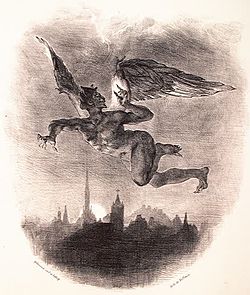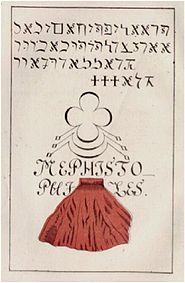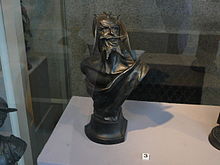- Mephistopheles
-
For other uses, see Mephistopheles (disambiguation).
Mephistopheles (also Mephistophilus, Mephistophilis, Mephostopheles, Mephisto, Mephastophilis and variants) is a demon featured in German folklore. He originally appeared in literature as the demon in the Faust legend, and he has since appeared in other works as a stock character version of the Devil himself.
Contents
In the Faust legend
The name is associated with the Faust legend of a scholar — based on the historical Johann Georg Faust— who wagers his soul against the Devil.
The name appears in the late 16th century Faust chapbooks. In the 1725 version which was read by Goethe, Mephostophiles is a Devil in the form of a greyfriar summoned by Faust in a wood outside Wittenberg. The name Mephistophiles already appears in the 1527 Praxis Magia Faustiana, printed in Passau, alongside pseudo-Hebrew text. It is best explained as a purposely obscure pseudo-Greek or pseudo-Hebrew formation of Renaissance magic.
From the chapbook, the name enters Faustian literature and is also used by authors from Marlowe down to Goethe. In the 1616 edition of The Tragical History of Doctor Faustus, Mephostophiles became Mephistophilis.
Greek elements may have played a part in the coining of the name, including Greek mē "not", phōs "light" and philos "lover", suggesting "not a lover of light" in parody of Lucifer ("light-bearer", a common epithet of Satan); in that case, the change from the presumed original mephoto- to mephist- may be due to a suggestion of the Latin mephitis ("a noxious exhalation from the ground; malaria").[1][2]
Alternatively, phosto- may be a variation of "Faust," yielding "not Faust-loving." Hamlin[3] suggests a derivation from the Hebrew Mephistoph, meaning "destroyer of the good."
Another possibility is a combination of the Hebrew words mephiz ("liar") and tophel ("destroyer").[2]
Another possible origin involves Latin mephitis, treated incorrectly as Greek because it contains '-ph-', plus the Greek superlative suffix -ιστος, plus Greek -ωφελης = "help(ful), useful": "he who is the worst or foulest sort of (alleged) help." (Compare Anopheles (a malaria mosquito) from Greek α(ν)- = "not", plus -ωφελης, = "no help, the reverse of help.")
Mephistopheles in later treatments of the Faust material frequently figures as a title character: in Meyer Lutz' Mephistopheles, or Faust and Marguerite (1855), Arrigo Boito's Mefistofele (1868), Klaus Mann's Mephisto, and Franz Liszt's Mephisto Waltzes.
Outside the Faust legend
Shakespeare mentions "Mephistophilus" in the Merry Wives of Windsor (Act1, Sc1, line 128), and by the 17th century, the name had begun to lead an existence independent of the Faust legend. Burton Russell[1] finds, "That the name is a purely modern invention of uncertain origins makes it an elegant symbol of the modern Devil with his many novel and diverse forms."
Interpretations of Mephistopheles
Although Mephistopheles appears to Faustus as a devil — a worker for Satan — critics claim that he does not search for men to corrupt but comes to serve and ultimately collect the souls of those who are already damned. Farnham explains, "Nor does Mephistophiles first appear to Faustus as a devil who walks up and down in earth to tempt and corrupt any man encountered. He appears because he senses in Faustus’ magical summons that Faustus is already corrupt, that indeed he is already 'in danger to be damned'."[4]
Mephistopheles is already trapped in his own hell by serving the Devil. He warns Faustus of the choice he is making by “selling his soul” to the Devil: “Mephistophilis, an agent of Lucifer, appears and at first advises Faust not to forgo the promise of heaven to pursue his goals”.[5] Farnham adds to his theory, “…[Faustus] enters an ever-present private hell like that of Mephistophiles”.[6]
Mephistopheles: What kind of angel?
Certain critics have viewed the Faust story as a distortion of Christianity. Susan Snyder interprets the play by Marlowe as an “inverted Saint’s life”, complete with the “sinful” early life (a student of divinity), “conversion” (to the Devil), reception into the Church (of Lucifer), “temptation” (by the Good Angel) which is overcome by help (of the Bad Angel), miracles and beatific visions (of the pagan Helen), and the final reception into the house of the Lord (Lucifer).”[7] However, Mephistophilis does warn Faustus of his regret for losing God and the joys of heaven. He wants Faustus’ soul but also may want to save him from the mistake he made. "Christianity speaks of hell for those who cast it aside. But, says he to Mephistopheles as he delivers to him the agreement to surrender his soul at the end of twenty-four years, 'I think hell’s a fable.' 'Ay,' says Mephistopheles, 'think so still, till experience change thy mind.'"[8]
Mephistopheles' relationship with Faustus
In Doctor Faustus, Mephistopheles acts as a guide to Faustus. Mephistopheles is not only a speaker for the Devil, but he is also seen as a possible lover to the character.[9] In the play, Faustus asks Mephistopheles for a wife and, when he returns, the woman is just a devil in disguise as a woman. According to Hammill, “the wife that [Mephistopheles] brings demonstrates that marriage is not a signifier that can stabilize the gender. The play... instead replaces this wife with a series of courtesans in an economy of homosocial exchange.”[10] Hammill also explains that Mephistopheles brings Faustus a wife who is not actually a woman because he wants to bring up sexual tension between Faustus and himself. This article describes the conversation between the two characters during this scene as “barely legible as male friendship”.[11] The article goes on to explain that the conversation is no longer considered to be friendly because the women whom they are discussing appear to have very masculine features.[11] According to another article, Marlowe was homosexual.[12] Orgel argues that “Marlowe's […] imagination was essentially homosexual”.[13] In “Myth, Psychology, and Marlowe’s Doctor Faustus”, Kenneth Golden explains Mephistopheles' role representing Faustus' alter ego constructed from his suppressed feelings.
References
Bibliography
- Burton Russell, Jeffrey, Mephistopheles: The Devil in the Modern World, Ithaca, NY: Cornell (1986); 1990 reprint: ISBN 978-0801497186
- Hamlin, Cyrus, et al., "Faust", New York, NY: W. W. Norton & Company (2001): ISBN 978-0-393-97282-8
- Ruickbie, Leo: Faustus: The Life and Times of a Renaissance Magician. The History Press (2009): ISBN 978-0750950909
Notes
- ^ a b Burton Russell 1992, p. 61
- ^ a b Leo Ruickbie: Faustus: The Life and Times of a Renaissance Magician. The History Press 2009. ISBN 978-0750950909
- ^ Hamlin 2001, p. 9
- ^ Farnham, Willard. Twentieth Century Interpretations of Doctor Faustus. New Jersey: Prentice-Hall, Inc.,1969: 6.
- ^ (Krstovic, J. O. and Marie Lazzardi. “Plot and Major Themes”. Rpt. In Literature Criticism from 1400 to 1800. Ed. Jelena O. Krstovic and Marie Lazzardi. Vol. 47. Farming Mills, MI: The Gale Group, 1999: 202)
- ^ (Krstovic 8)
- ^ (Marlowe, Christopher. Doctor Faustus. “Critical Introduction.” Ed. Keith Walker. Edinburgh, 1973: 9)
- ^ (Farnham 8)
- ^ (Hammill, Graham L. "Faustus' Fortunes: Commodification, Exchange, and the Form of Literary Subjectivity." English Literary History 63 (1996): 324-329. Project MUSE.)
- ^ (Hammill 327)
- ^ a b (Hammill 328)
- ^ (Orgel, Stephen. "Tobacco and Boys: How Queer Was Marlowe?" Journal of Lesbian and Gay Studies 6 (2000): 555-76. Project MUSE.)
- ^ (Orgel 566)
External links
Categories:- Fictional demons
- Theatre characters
- Characters in Goethe's Faust
- Faust
- Tricksters
Wikimedia Foundation. 2010.




